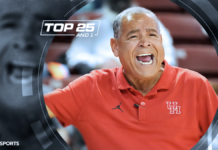Adia Barnes of Arizona and Dawn Staley of South Carolina hope that their appearance in the Final Four will give more opportunities to the other Black women head coaches out there.
Although bright, the future of women’s college basketball coaching is still a bit clouded by lingering biases about coaching expertise and authority.
The outdated, exclusive path to head-coaching royalty
After a collegiate playing career at Albany and Indiana, Tara VanDerveer soon embarked on a collegiate coaching career, taking advantage of connections to grab an assistant coaching position at Ohio State. Two years later, she was head coach at Idaho. She would quickly rise the coaching ranks, returning to Ohio State to become head coach after two seasons. Five seasons later, at 32 years old, VanDerveer was hired as head coach at Stanford, tapped to turn around the floundering Cardinal program.
In short, VanDerveer was nobody — a promising but mostly anonymous coach — who became a somebody. Her rise was aided, of course, by her basketball acumen.
VanDerveer’s path resembles that of the other institutional coaches of her generation. Pat Summitt (hired at 22 years old at Tennessee), Muffett McGraw (hired at 31 years old at Notre Dame) and Geno Auriemma (hired at 29 years old at Connecticut) similarly were offered early opportunities to put their imprint on then-unremarkable women’s hoops programs. They were given chances and made the most of them, turning Tennessee, Notre Dame and Connecticut into all-time programs.
This 1970s- and 1980s-era path to coaching canonization — with young, relatively unknown and unproven white coaches hired by major universities — is no longer viable. And for some, it never was viable. Yes, VanDerveer, Summitt, McGraw and Auriemma are absolutely amazing coaches, but they also were entrusted to take control of programs in ways that people of color, especially Black women, have not been.
In 2021, a new path is being paved. And while improved, it is still imperfect.
The representational power of Dawn Staley and Adia Barnes
In leading their teams to the Final Four, Dawn Staley and Adia Barnes put a spotlight on the plight — and the potential — of Black women head coaches.
Like their white predecessors of generations prior, they were hired to kickstart two stumbling programs. South Carolina finished near the bottom of the SEC standings the five seasons prior to Staley’s arrival in 2008. Arizona likewise was mired at the bottom of the Pac-12 before Barnes returned to her alma mater in 2016.
Yet, Staley and Barnes certainly were not nobodies. They were somebodies.
A three-time Olympian, Staley was one of the faces that introduced women’s basketball to the masses in the United States in the mid-1990s, playing in the ABL and WNBA in addition to starring for Team USA. While less heralded than Staley, Barnes is exemplary of the first generation of women hoopers who were able to translate a successful collegiate career into a domestic professional career, carving out a seven-season career in the WNBA that included a title with the Seattle Storm in 2004.
:no_upscale()/cdn.vox-cdn.com/uploads/chorus_asset/file/22421585/2108526.jpg)
Once given the opportunity to stalk the sidelines in Columbia and Tucson, they executed incredibly impressive turn arounds. South Carolina is now a women’s basketball powerhouse, racking up wins, raking in top-ranked recruits and expanding their rabid FAM base. Arizona appears well on the way to such a status, as a trip to the national championship is both the culmination of an upward trajectory and the foundation for even more success.
Through these achievements, they have become representational beacons, embodying and exulting the still-overlooked and under-appreciated power of Black women head coaches.
Dawn Staley stressed this in a diary entry for The Undefeated:
It’s nothing against other coaches. We’ve seen them dominate this stage for years. What it does is it makes them seem like they’re the only ones that can get here, they are the best coaches. They are the best representation of our game. When players only see Geno [Auriemma], and they only see Kim [Mulkey], or they only see Tara [VanDerveer] – if you look at the history of our game, those three coaches make up a great deal of Final Four appearances. If that’s all you see, you may take a Black child that lives for going to the Final Four and winning a national championship, those are the only three schools that have dominated appearances in the Final Four. Now, you change the narrative a little bit. I’m here, now Adia is here.
In her press conference before the national championship game, Barnes extensively discussed her representational significance.
The importance of expanding the paths for Black women to become head coaches
However, it is important to reiterate — Staley and Barnes were somebodies. Other Black women who are head coaches at prominent programs also were somebodies. There’s Kara Lawson at Duke, Niele Ivey at Notre Dame, Nicki McCray at Mississippi State and Tina Thompson at Virginia, among others.
:no_upscale()/cdn.vox-cdn.com/uploads/chorus_asset/file/22421572/50906722.jpg)
Yes, Staley and Barnes are modeling a more inclusive path to coaching opportunity. Yet, the Black women who have followed this path are already exceptional, having established themselves as high level players in college or the pros before embarking on their coaching careers.
While it is exciting to see Black women who balled out at big time colleges and/or in the WNBA leading teams to the top of the sport, it is imperative that this not become the only model for Black women, or other women belonging to minority groups, to become head coaches.
As Staley asserted before the Final Four:
You give Black women an opportunity. Bring them in, interview them. If you don’t hire them, let them know why. So we can continue to work on perfecting our craft and our profession. There are a lot of people out there who aren’t getting the opportunities they should. Because this is exactly what can happen when you give a Black woman an opportunity.
With all that said, a number of Black women without major collegiate or professional playing experience have received head coaching opportunities in recent years, earning a position by steadily working their way up the assistant ranks. There’s Amaka “Mox” Aguga-Hamilton at Missouri State, Yolett McPhee-McCuin at Ole Miss and Jesyka Burks-Wiley at FIU.
New hires have continued this mini-trend. Memphis just hired Katrina Merriweather away from Wright State. Auburn tapped Johnnie Harris, long-time assistant to Vic Shafer, to become their head coach. Wisconsin nabbed Marisa Moseley from Boston University.
For all the ways that the spotlight has, deservedly, been on Staley and Barnes, it is these less well-known women who present the most viable, repeatable path for increasing the number of Black women head coaches in women’s college basketball.
The biases of race and gender that still can inhibit Black women head coaches must be abandoned
It is also worth recognizing the barriers that still can ensnare Black women head coaches. Namely, they are subject to more strict scrutiny. Realizing this, these women consistently have conducted themselves with the utmost class, adhering to the model pioneered by the great C. Vivian Stringer.
Even still, normal coaching comportment can become cause for “controversy,” as evidenced by the absurd kerfuffle about Adia Barnes using a few expletives in the huddle as her team was on the verge of upsetting UConn in the Final Four.
Let’s imagine a camera caught Jedd Fisch, head coach of the University of Arizona football team, saying a few “choice words” to his team as they were about to knock off Nick Saban and the Alabama Crimson Tide, the college football equivalent of Geno Auriemma and the UConn Huskies. It’s extremely doubtful that Fisch would receive anything but praise for his passion. His words would be seen as evidence of the leadership that inspired his team to do the improbable.
But it was expected that Barnes should apologize?
Barnes didn’t, instead addressing “the moment,” on multiple occasions, with frankness, honesty and humility.
Adia Barnes on a morning press conference and is asked about the TV clip showing her animated postgame speech to her team:
“I’m not apologizing for it because I don’t feel that I need to apologize… I wouldn’t take it back.” pic.twitter.com/C54yUIwqBb
— Alec White (@AlecWhite_UA) April 3, 2021
That a head coach using profanity in a huddle during the heat of a game could be perceived as a problem indicates how ideologies of white femininity — that women are precious and must be protected — are still imposed on all women athletes. That the passion of a Black woman head coach is interpreted as excessive is further evidence of the enduring influence of racial and gender prejudices.
This same stew of old, ingrained racial and gender biases are why Staley and Barnes remain exceptional exceptions when it comes to head coaches at the highest level of women’s college hoops. While they have introduced much of the nation to a new kind of college basketball coach, any lingering assumptions about race, gender, authority and expertise must be abandoned — by universities, by the media and by other stakeholders — before Staley, Barnes and other Black women head coaches can, finally, become part of the norm.













































